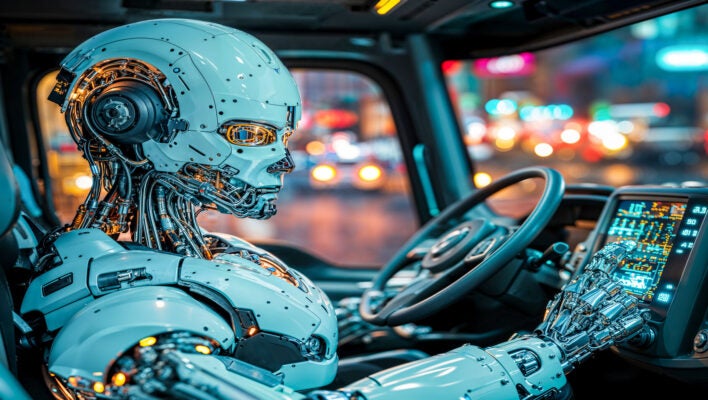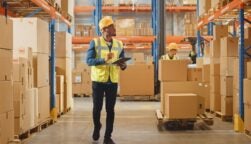Truck drivers are one of the professions least impacted by AI, according to a new, wide-ranging study from Microsoft.
Although many in the logistics industry are embracing advancements in artificial intelligence and anticipating the rollout of autonomous trucks over the next decade or two, “Industrial Truck and Tractor Operators” aren’t turning to AI to help them complete their jobs in anything like the numbers other professions are.
The logistics industry is at a critical inflection point, with an ongoing labor shortage causing problems for global supply chains. According to our Moving Goods With Fewer Hands report, one of the biggest barriers to hiring is a dearth of skilled applicants. But unlike other industries, companies won’t be able to turn to AI to pick up the slack just yet.
Truck Drivers Among Jobs Least Impacted by AI, Says Report
Setting out to establish which jobs are most and least likely to be replaced by AI, Microsoft researchers analyzed 200,000 anonymized conversations with Bing Copilot users in 2024.
The study, titled Working with AI: Measuring the Occupational Implications of Generative AI, also drew on the federal government’s job classification system to devise an “AI applicability score” for each user’s occupation.
 This just in! View
This just in! View
the top business tech deals for 2026 👨💻
Industrial truck and track operators ranked among the workers least likely to seek help on-hand from AGI, along with tire builders, Surgical assistants, massage therapists, and concrete finishers.
The researchers noted, however, that their data doesn’t show actual job displacement. Rather, it shows how “AI capabilities overlap with work activities”. Of course, job specifications could change in light of what AI can and can’t do, meaning some jobs slated to be heavily impacted may not ultimately be affected.
However, it does give a good indication of the sorts of employees seeking assistance from artificial intelligence today, and those that aren’t. And naturally, truck drivers aren’t going to be asking AI to take the wheel – at least for the time being.
Knowledge, Communication Roles Most at Risk; Physical Work Safe
The 25 jobs considered most likely to be replaced by AI include interpreters, historians, passenger attendants, sales reps, and more.
Many of these roles are unlikely to surprise onlookers, with several companies replacing their workers with AI in the last couple of years. Google, for instance, has reportedly laid off workers in its ad division while heavily deploying AI across customer care and sales processes.
Knowledge work and roles that revolve around communication dominate the list of “at-risk” professions. On the other side of the coin, jobs built around manual labor, physical presence, or machine operation, rank the lowest.
Will Trucking Jobs Ever be Replaced by AI?
According to Microsoft’s study, at present, there don’t seem like too many jobs that AI tools can actually help truckers with.
Of course, AI is built into the technology used in the industry every day to help with things like minimizing fuel consumption and optimizing routes, but it’s some way off from replacing actual workers, even during a labor shortage.
Big AI advancements like autonomous trucks are yet to make their mark on the logistics industry, largely as a result of legal complications. Self-driving trucks have their share of opponents within the industry, with detractors citing safety concerns, as well as the threat to the existing workforce.
But if the current pace of AI development is anything to go by, seismic change could be much, much closer than we think right now.




